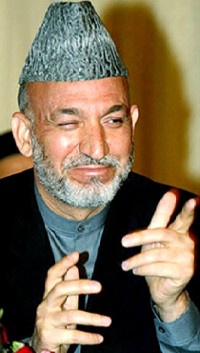Afghan President Hamid Karzai is coming under increasing fire from both his domestic rivals and his international allies today after claims yesterday that the vast fraud in the August election was part of a “UN conspiracy” designed by foreigners to deny him a second term in office. There is fear that the comments will do serious damage to support within Afghanistan for the ongoing NATO war effort.
 The White House termed the comments ‘genuinely troubling’ and demanded ‘clarification’ from Karzai. President Karzai also had to meet with US ambassador Karl Eikenberry today, as part of what the State Department said was an effort to find out “what he meant by these remarks.”
The White House termed the comments ‘genuinely troubling’ and demanded ‘clarification’ from Karzai. President Karzai also had to meet with US ambassador Karl Eikenberry today, as part of what the State Department said was an effort to find out “what he meant by these remarks.”
US officials speaking anonymously to the media warned that the Karzai comments saw a “break with us in a major way” and one that would not be easily fixed. With the US already leaning on Karzai to do something about corruption, the perception that NATO and the Afghan government are not partners is palpable. The tensions are hardly new, however.
Karzai has often played up his “rivalry” with the international occupation forces, and the United States in particular, as a way of portraying himself as an independent mover in Afghan politics. Yesterday’s comments appear to have touched a nerve, however, likely because there remains much international disquiet over the extent to which fraudulent votes cemented Karzai’s reelection over Abdullah Abdullah.
And unsurprisingly Abdullah joined in on condemning Karzai’s comments. Abdullah warned that the leadership had “lost the way” and that Karzai’s comments were “treason to the national interest of Afghanistan,” a move which blurred the line between resistance and terrorism and which sent a negative message to his security forces.
Karzai defeated Abdullah in the August election with over a million fraudulent votes cast on his behalf. A runoff vote was initially scheduled, but Abdullah declined to participate after Karzai refused to allow any major rule changes to curb fraud. The Afghan president is now attempting to solidify his control over the election watchdogs, a move which threatens international backing for the upcoming parliamentary election. The attempt was unanimously opposed in the lower house of parliament, but supported in the upper house.


